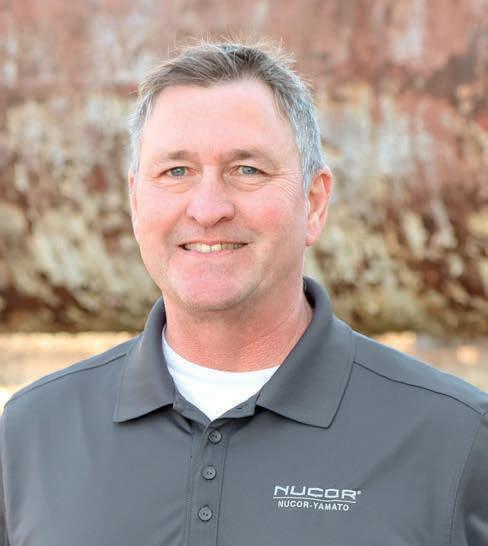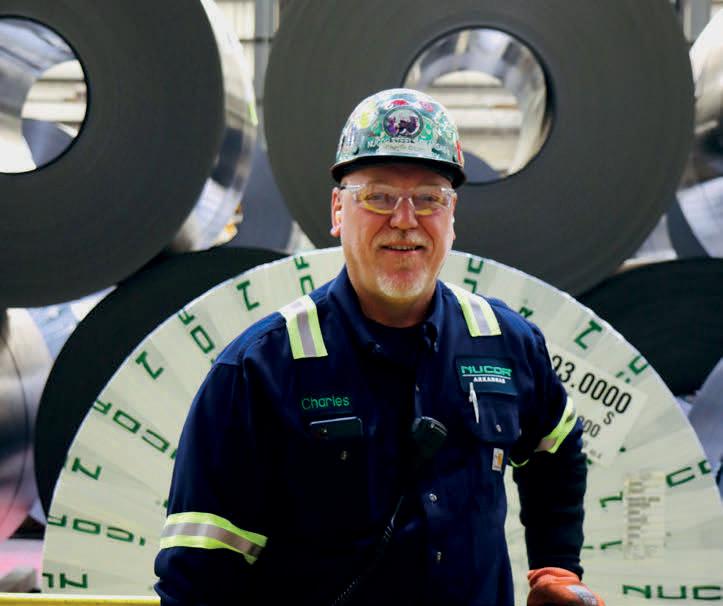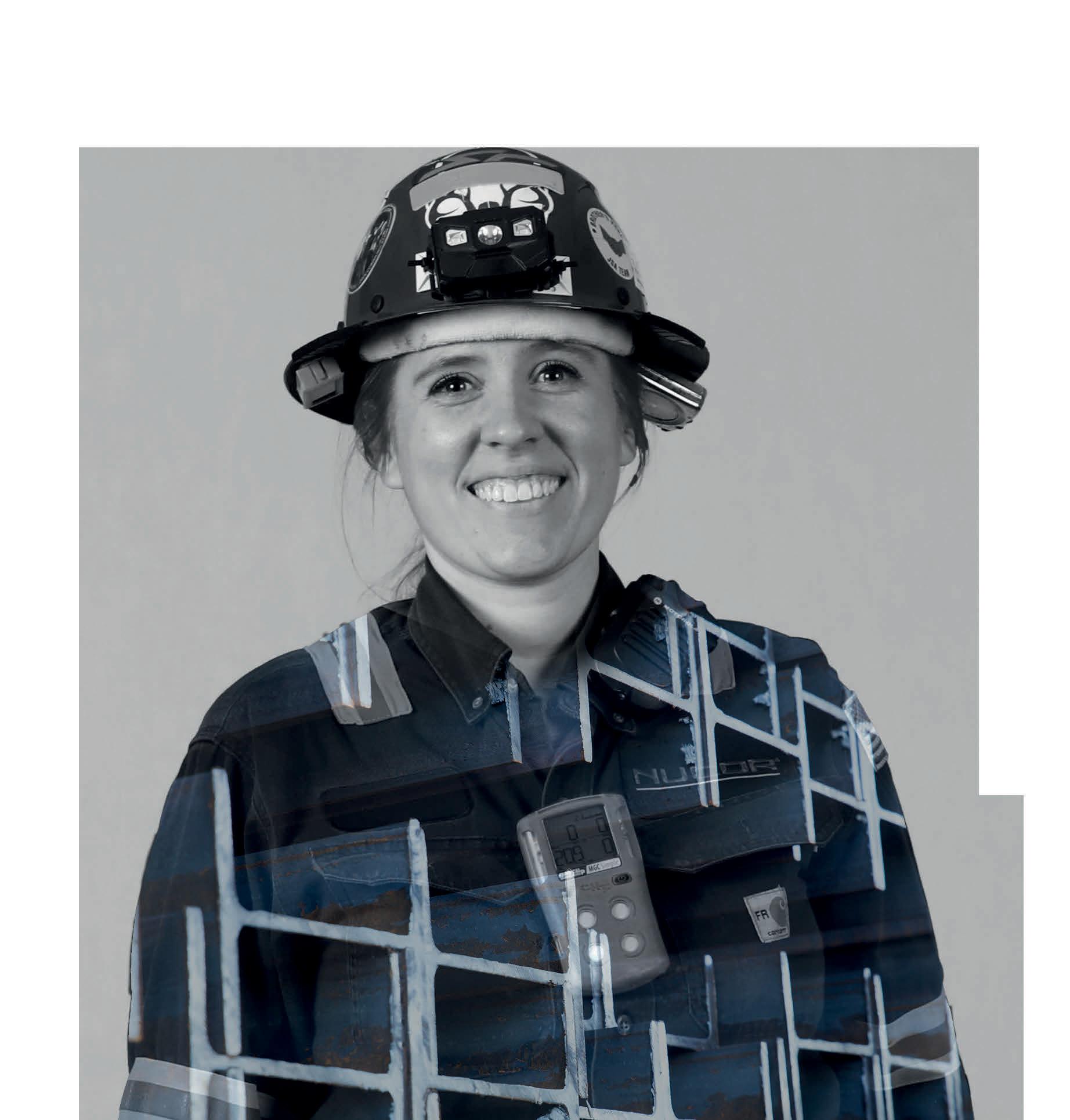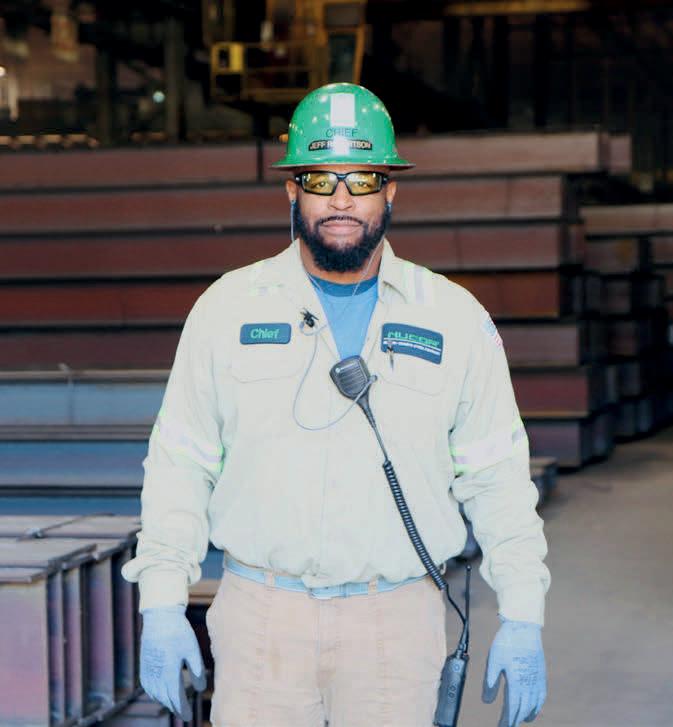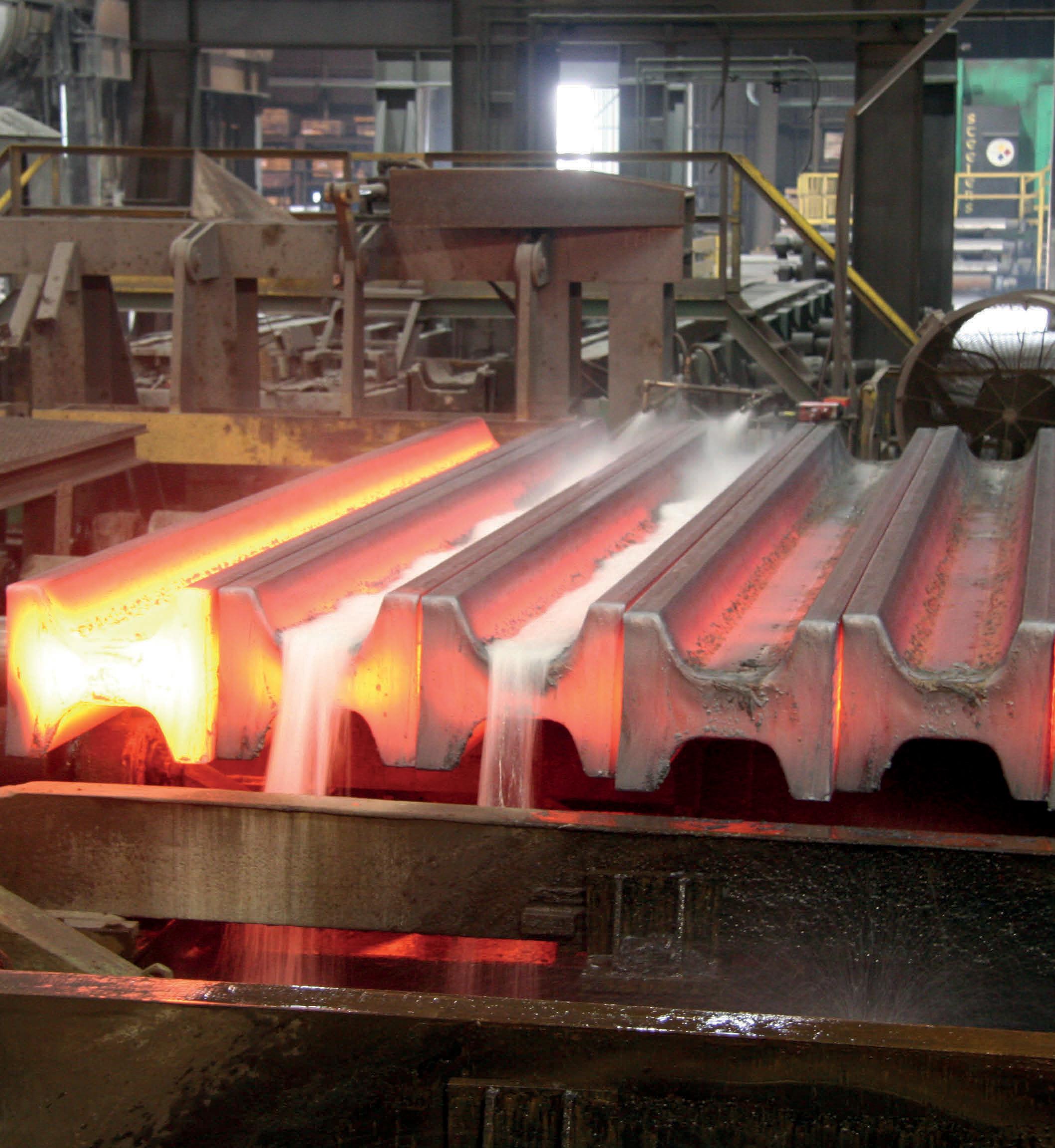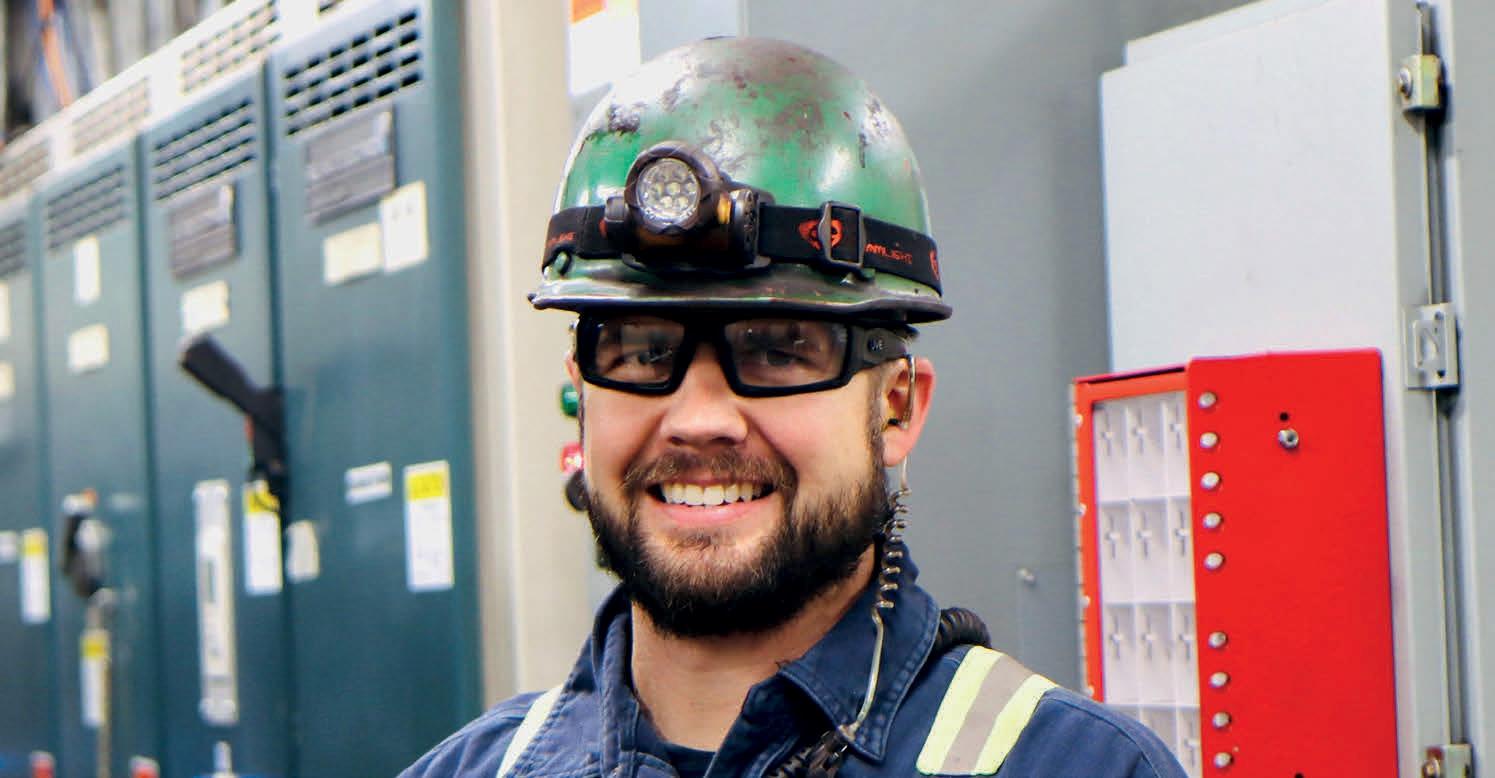7 minute read
and) my family.
from BluePrint 2023
Next Article
Working at Lockheed Martin comes with life-changing benefits. After serving as a funeral home director for 11 years, I joined Lockheed Martin's apprenticeship program. Through hands-on classroom training and intentional mentorship, I now perform manufacturing inspections using certified skills on both ground and flight electronic assemblies. For the first time, I have the opportunity to easily save for retirement, go back to school and advance my career. Explore career opportunities today at lockheedmartinjobs.com/camden-operations
KEITH EVERHART
Assembly Senior Specialist, Lockheed Martin
Hometown: Camden
Age: 38
Years with Lockheed Martin: 14
BLUEPRINT: Did you know about the manufacturing in your hometown growing up?
KEITH EVERHART: Unfortunately, in my high school, Harmony Grove, it wasn’t really explained how much opportunity we had right down the road. Because of that, I went to college like all my other friends without really knowing what I wanted to get into. I went three and a half years to a local college, have no degree and I had a boatload of student loans to pay back. If I could do it all over again, it would have never happened to me.
It was in college, however, that I actually started working in the plants around the area and working for the local electric company. When college didn’t pan out, I got an awesome opportunity to start with Lockheed Martin.
BP: How have you grown since you’ve been here?
KE: Pneumatic tools are everywhere at Lockheed Martin, and I will be honest, I wasn’t even sure what that was back in high school. Now, I don’t know how to live without them.
I have also grown in my leadership ability. With this new role that I’ve recently taken took on, I have grown in how to be a co-worker but also an authority figure without the actual title. It’s very hard to be friends and a boss. That has been a challenge but I’m getting there.
BP: People have a certain vision of what a manufacturing work environment is like. What’s the reality?
KE: It’s nothing like the stereotype about manufacturing. At Lockheed here, it’s clean. We pride themselves on “clean-as-you-go” because we have 100 percent foreign object debris prevention, and one of the ways to do that is by cleaning up as you go and not making a mess in the first place. People think the conditions in a plant are uncomfortable but there is heat in the winter, air conditioning in the summer; you’re not in the elements all day. I have been in other plants that didn’t do that, so I know how good it is here. If it’s raining or snowing, the hardest part you’ll face is walking from your car to the front door.
BP: Sounds like you’re very happy with where you are and what you’re doing.
KE: Yes, sir. I came out here not knowing much about anything. I’ve made the most of every opportunity I’ve been given and I’ve learned a lot. I come to work, I have great attendance and do what my boss asks me to do. I can’t wait to see what’s next.
Quality Engineering Lead, Aerojet Rocketdyne
Education: Southern Arkansas University, Magnolia
Major: Engineering/Computer-aided Design (CAD) modeling
BLUEPRINT: Describe your transition out of high school or college.
TREY GEER: The independence and ability to learn with hands-on experience was the most rewarding part of transitioning to a full-time career.
BP: How do the skills you learned in school help you in your role at your current organization?
TG: College developed the fundamental thought process of understanding problems and investigating and determining solutions.
BP: How does Aerojet Rocketdyne support recently graduated employees?
TG: AR supports recently graduated employees by instituting a phased training approach. This allows a recently graduated new employee such as myself to learn from experienced peers, but also to develop independence and provide personal input.
BP: What’s your favorite part about your job?
TG: Achieving a common goal with a dedicated team such as developing new processes and solving engineering problems.
BP: What advice do you have for high school or college graduates who are preparing to transition out of school?
TG: I’d definitely advise them to find a career occupation that inspires them to learn something new every day.
BP: Related to that, why should students consider a career in this industry?
TG: The aerospace standard is one of the highest standards in any industry or field. Once an employee has been exposed to that standard, it is easier to carry that expectation and mindset to any future career opportunities or even into your personal life. I would recommend it to anyone.
HOT JOBS!
Inspector
WHAT DOES THE JOB DO?
Inspectors use various measurement and/or calibrated devices to inspect the products assembled at the Camden facility. They are also responsible for rejecting and generating quality notifications for hardware that fails to meet product specifications and assisting quality engineers with functions such as stock purges, product containment and nonconformance documentation.
WHY IT’S IMPORTANT:
Inspectors ensure that we provide the best product to our customers that will work right the first time, every time.
ESSENTIAL SKILLS AND ATTRIBUTES:
The most successful inspectors possess the ability to interpret product specifications and/or drawings or blueprints, use calibrated inspection equipment to validate dimensions, and pay strong attention to detail. It is also desired for them to have strong teamwork and communication skills as well as the integrity to uphold the highest possible quality standards.
WHAT MAKES THIS POSITION IN HIGH DEMAND?
Inspection of the quality of our products ensures it adheres to the Lockheed Martin standard and the product specifications as part of our ongoing commitment to our customers.
HOW DO I LEARN MORE? lockheedmartinjobs.com
HOT JOBS!
CHRISTA WORD
Engineering Aide, Lockheed Martin
Hometown: Camden
Age: 30
Years with Lockheed Martin: 2.5
BLUEPRINT: What made you want to embark on a manufacturing career?
CHRISTA WORD: My background is a little different. I graduated from high school and went to occupational therapy assistant school for my bachelor’s degree in that. I’ve actually been an occupational therapist for nine years and I still do that on Fridays and occasionally on the weekends, just to keep my license up.
When COVID hit and shut the schools down, it stopped much of the patient traffic coming into the hospitals for therapy. That took away my job and left me with a 1-year-old and no paycheck for six months. I came out here and started as a quality inspector. I did that for a little over a year, then I took this job and am about to start on my second promotion.
BP: Tell me about the company benefits.
CW: I work four 10-hour days, which is a benefit because you work four days a week and then you have three days off every week. You also have paid overtime after 40 hours; it’s time and a half, and if you work on a Sunday or a holiday it’s double time. Some people don’t count that as a benefit, but if you’re really struggling for money, that helps.
The retirement plan out here is like nothing I’ve ever heard of. They put in a percentage of your base salary, then if you put in up to a certain percent, they’ll match that. You also have your normal health, vision and dental insurance and they also offer a health savings account. We can withhold money from our paycheck to go onto a health card that can be used just for health expenses, and that money is not taxed.
BP: Has the company helped you with your technical education?
CW: Yes, all of it. If the company can benefit from you obtaining a degree, they’ll pay for it if you maintain a C average or better. I will soon graduate with my bachelor’s degree from Southern Arkansas University in Magnolia. Prior to that I had three associate degrees.
BP: Anything else?
CW: I would say the biggest perk, besides the retirement, is the paid time off that we get. I get paid vacation time and I get paid floating time and I get paid shutdown time and we get certain holidays off, too. Lockheed takes a lot of pride in their people enjoying their family and life. They know if employees get to be with their families and do those things that bring them happiness, then they’re going to stick around.
Assembler
Company: Lockheed Martin
WHAT DOES THE JOB DO?
Assemblers perform a variety of tasks ranging from repetitive to nonrepetitive production assembly operations on mechanical assemblies and subassemblies, such as running automated equipment and applying touch-up paint. An assembler also works from diagrams and drawings following detailed planning, and uses hand and/or power tools, jigs and saws. They may also disassemble, modify, rework, reassemble and test experimental or prototype assemblies and subassemblies according to specifications and under simulated conditions.
All Camden assemblers participate in the Camden Manufacturing Apprenticeship Program, a nationally recognized apprenticeship program, to provide them with the knowledge and hands-on experience to successfully and consistently assemble quality products for customers.
WHY IT’S IMPORTANT:
This position is the backbone of ensuring all products are completed with the highest quality and able to be delivered to the customers on time.
ESSENTIAL SKILLS AND ATTRIBUTES:
At minimum, an assembler must possess a high school diploma or GED equivalent, the desire and/or ability to use hand tools, ability to read and interpret assembly drawings or instructions. The ability to operate equipment and understand mechanical assemblies as well as strong teamwork, communication and problem-solving skills are also highly sought after.
WHAT MAKES THIS POSITION IN HIGH DEMAND?
This position makes up the majority of employees at the Camden facility who are responsible for completing their tasks accurately and in a timely manner to ensure product success.

HOW DO I LEARN MORE? lockheedmartinjobs.com
Manufacturing Expediter
WHAT DOES THE JOB DO?
A manufacturing expediter supports production work in a fast-paced environment by expediting, routing and dispatching materials and parts in accordance with production schedules and commitments.
A person in this role also reviews master production schedules to determine shortages and alert proper authorities of potential problems, keeps records of completed orders, schedules in-house material transportation, assists with work orders and prepares DOT paperwork as required.
WHY IT’S IMPORTANT:
These individuals track all product flow and use their skills to keep production on track and assure that we meet customer commitments and product deliverables.
ESSENTIAL SKILLS AND ATTRIBUTES:
At minimum, a manufacturing expediter must possess a high school diploma or GED equivalent and forklift driving experience. They are even more successful in their position if they also have SAP and inventory experience, knowledge of the manufacturing environment and excellent communication skills.
WHAT MAKES THIS POSITION IN HIGH DEMAND?
This position ensures we uphold the commitments made to our customers so we are able to retain our excellent customer service and world-class production reputation.
HOW DO I LEARN MORE? lockheedmartinjobs.com



